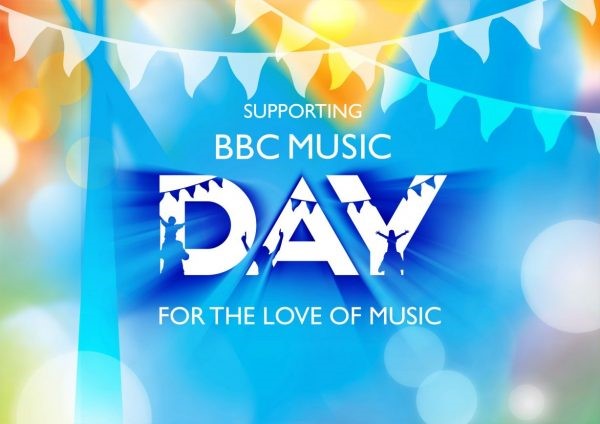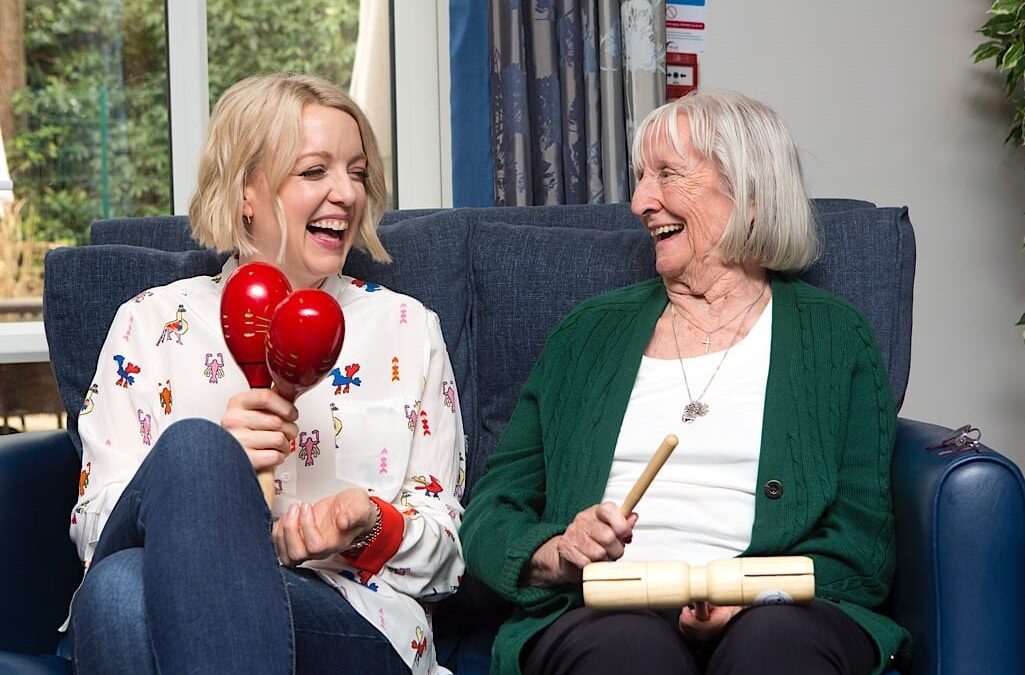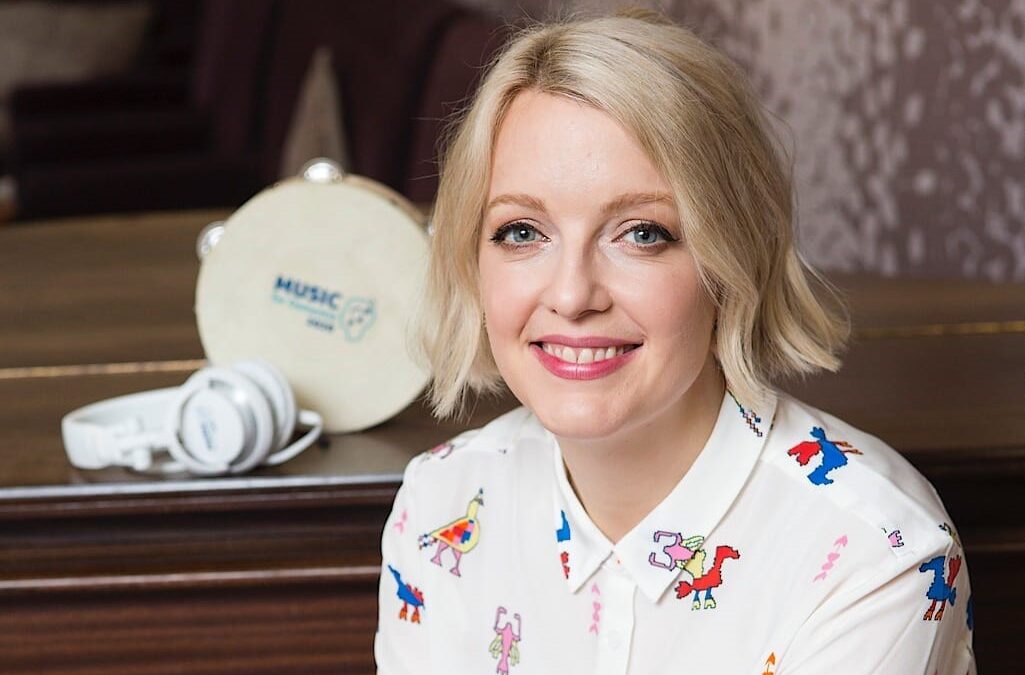TV and radio presenter Lauren Laverne urges people with dementia, their families and carers to build music playlists this Christmas with the launch of free guides
- The multi-talented radio DJ is spearheading the Music for Dementia 2020 Campaign, which calls for the government, music industry, health and social care sectors and friends and families to work towards giving everyone with dementia the right to music as part of their care, as well as to access music free of charge, wherever they are.
- As Music for Dementia 2020’s ambassador, she is encouraging people to create playlists for their loved ones using new step-by-step guides, after research reveals the benefits of personalised music for people living with dementia.
- Lauren speaks about creating a nine-hour playlist with her dad shortly before his death and continues to listen to and update it.
- She is encouraging people to share their playlists online to raise awareness of how this can help families during Christmas, which can be a hard time of year.
TV and Radio host Lauren Laverne is launching a new initiative to highlight the positive impact music can have for people living with dementia – with a series of guides on how to create the perfect personalised playlist.
Growing evidence shows listening to music with a personal connection has huge benefits for people living with dementia, however there is not enough public awareness of how music can help, and it is a lottery whether someone living with dementia will experience music as part of their care.
The festive season can be a stressful time for those living with dementia, their families and carers as usual routines are disrupted. However, creating a personalised playlist can reduce some of the symptoms of dementia such as agitation, as well as bringing people together to build an emotional connection, facilitate conversations and create memories.
The presenter, who made a nine-hour playlist with her father, Dr Leslie Grofton, before he died last November, speaks out today about the comfort she took from creating a playlist with her dad. Lauren says she continues to add to it and incorporate songs into her flagship breakfast radio show.
Lauren said: “I have seen first-hand the deep conversations, comfort and ongoing legacy that can grow out of creating a playlist with a loved one. It was something I did with my dad before he died of kidney disease last year. Music was a huge part of his life but by then he was too poorly to access his own collection. It took a whole day and when we were done, we were left with nine hours’ worth of music. I’m still adding to it as well as listening to it and it is enormously comforting. It helps me feel closer to him. I’m so glad I did this when he was still around, it not only provided a deeper connection when we were together, but his favourite music can still reach me and speak to me now. I want this to be available to everyone who has a loved one living with dementia.”
The way people are using technology to listen to and enjoy music is changing, but not everyone caring for someone with dementia knows how to access these platforms and use them to create playlists. That’s why Music for Dementia 2020 has published guides to help create playlists on Amazon, Apple, Spotify, Google and YouTube.
The Music for Dementia 2020 guides include practical advice for those with dementia and their carers on how to build a playlist on a variety of platforms.
Neil Utley, Founder and Trustee of The Utley Foundation, said: “As someone who is involved in the music industry and just loves music, I am delighted that the Music for Dementia 2020 Campaign and Playlist for Life have come together to promote these guides.
We know the devastating impact dementia can have, not just on the individual but their families and carers too. Everyone living with dementia should be offered music as part of their care. We are calling on the music industry, health and social care sectors, and the general public to work with us to make it free and easy for people with dementia to access music. “
Music for Dementia 2020 campaigns for people with dementia to have the right to music as part of their care and access music free of charge, wherever they are. We believe everyone diagnosed with dementia must be offered music as part of their care, no matter who or where they are. While some streaming services offer free accounts, the music is interspersed with adverts, which can disorientate and interrupt their experience of listening to their personalised playlist.
Grace Meadows, Programme Director at Music for Dementia 2020, said: “Having access to personalised music, in the right way and at the right time, has been shown to be much more effective than just putting the radio on or listening indiscriminately to music. The act of creating a personalised playlist, whether that’s done online, writing it down on a piece of paper or by going through your music collection with someone, makes up the soundtrack of your life.
Often people living with dementia, their friends and carers don’t know how to get on to the right platform to stream a playlist, nor do they know how to have a conversation with their loved one about what music they would like on it. By launching new step-by-step visual guides, which can be found on www.musicfordementia2020.com we are encouraging people to create a playlist this Christmas which can reduce some of the symptoms of dementia such as agitation, as well as bringing people together to build an emotional connection, facilitate conversations and create memories.”
Notes for Editors
What is a playlist?
Playlists offer a way of musically capturing all the songs or pieces of music that make up the soundtrack to your life. There are a number of ways in which you can make a playlist, from writing a list a list of songs on paper to burning a CD to creating one digitally online.
Personalised music can reduce some of the symptoms of dementia. We will be calling on family members and carers to develop playlists for people living with dementia all year round, not just at Christmas.
Benefits of using playlists:
A major review in 2017 confirmed that ‘among sensory stimulation interventions, the only convincingly effective intervention for reducing behavioural symptoms (specifically agitation and aggressive behaviour) was music therapy’. (Reference: https://bmjopen.bmj.com/content/7/3/e012759)
A second review that year showed “music intervention significantly reduces agitated behaviours in demented people.” (Reference: https://www.playlistforlife.org.uk/the-science)
Our partners, Playlist for Life, bases its work upon the evidence-based erdner Protocol 5th Edition developed over the course of twenty years at Stanford University. The protocol describes how correct use of playlists is proven to bring about reductions in (1) use of psychotropic medication (2) use of restraints (3) stress and distress (4) wandering.
About Music for Dementia 2020
Music for Dementia 2020 campaigns for people with dementia to have the right to music as part of their care and access music free of charge, wherever they are. We are calling on the music industry, philanthropists, and the health and social care sectors to help make it free and easy for people with dementia to access music.
Music for Dementia 2020 has partnered with Live Music Now to launch a new Musical Care Taskforce, which brings together more than 60 leading representatives from across health, social care, dementia and music with the aim to make music an essential element of dementia care.
In September 2019, we launched our Musical Map – an online interactive map which will become the largest and most comprehensive database of dementia friendly music services in the UK.
To find out more about the campaign, musical map and the taskforce, visit www.musicfordementia2020.com
About The Utley Foundation
The Utley Foundation was founded in 2014 by Neil and Nicky Utley. The Foundation exists to advance social causes and to act as a catalyst for greater funding and wider action for the causes it supports. Music is a personal passion of the founders and trustees and underpins many of the key funding areas of interest to the foundation. The trust has other charitable objectives including Armed Forces Veterans, Children and Overseas Aid.



